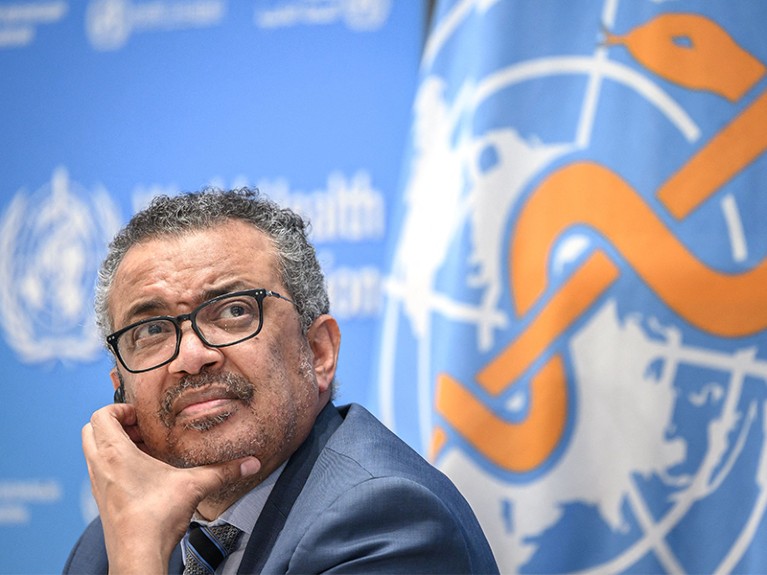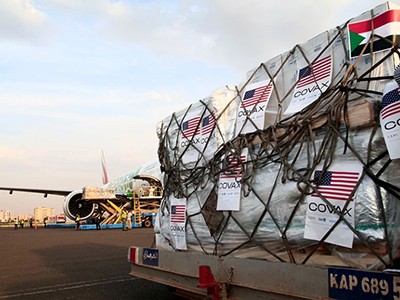Research funders must join the fight for equal access to medicines

World Health Organization director-general Tedros Adhanom Ghebreyesus has voiced concerns about progress in pandemic treaty talks.Credit: Fabrice Coffrini/AFP/Getty
For almost a year, nations have been negotiating the terms of an international agreement to better prepare the world for future pandemics. The talks are due to conclude this year, but countries are poles apart on key issues. In a statement last week, the World Health Organization (WHO)’s director-general Tedros Adhanom Ghebreyesus acknowledged that the talks are in trouble, meaning that the deadline might not be met.
The ideal outcome would be for high- and low-income countries to have the same access to life-saving vaccines, drugs and other tools to combat a global health emergency, at a fair and transparent price. Although memories of the COVID-19 pandemic are fading, many people in low- and middle-income countries (LMICs) will never forget that people died because they had to wait for scarce vaccines, while leaders of high-income nations paid large sums to ensure more than adequate supplies. LMIC negotiators have an idea for how to stop this from happening in the future. The research community should consider backing it.

What the WHO’s new treaty could mean for the next pandemic
The best way to extinguish competitive behaviour in vaccine and drug procurement during a pandemic is to prevent such behaviour happening in the first place. During the COVID-19 pandemic, countries agreed to work with the WHO and with pharmaceutical companies to distribute drugs, vaccines, tools and technologies equitably through COVAX, a global vaccine-sharing scheme. But this scheme failed, because wealthy countries did not honour their pledges.
As part of the treaty discussions, LMICs are asking for public funders of scientific research to require that any pandemic-related drugs, vaccines or life-saving technologies that result from those organizations’ grants be shared equitably during a global health emergency. Funders should agree to this. It would be a one-time move, with the potential to save many lives.
Funders could, for example, require grantees to openly share study results. They could also require that products arising from those studies be priced affordably. Moreover, funders could retain certain intellectual property (IP) rights to be used only when there’s a necessity to develop and distribute products equitably.
Researchers played, and continue to play, an important part in the evolution of our understanding of SARS-CoV-2 and COVID-19 by openly sharing research findings. Shared data on genome sequences and protein structures was necessary to create the vaccines and drugs that eventually controlled the pandemic. LMICs are asking for the same spirit from research-funding agencies and companies that researchers work with.
Groundhog Day
However, the latest version of the treaty text does not include such provisions. Some European countries say that the World Trade Organization (WTO), not the WHO, is the organization to host discussions relating to IP rights. However, this disregards how, during the pandemic, WTO member states failed to temporarily waive IP rights for COVID-19 vaccines and therapies, despite a focused campaign led by India and South Africa, which Nature supported.
Other high-income countries say that it could be complicated to include such conditions in research-funding contracts. Some funders might view these stipulations as burdensome on researchers. Moreover, in the United States at least, such a provision will almost certainly struggle to win the necessary approval from elected lawmakers.

Even after COVID, the world’s vaccine strategy is failing
The preferred approach of the United States and many European countries is to negotiate agreements without passing laws. But we know the limitations of the voluntary approach. The US government tried and failed to persuade the biotechnology company Moderna, based in Cambridge, Massachusetts, to license its COVID-19 vaccine to LMIC manufacturers, despite having given the company more than US$1 billion of public funding to support its vaccine research.
Attaching conditions to public funding is, in itself, not new — and in this instance, it would be for pandemic emergencies only. One example is the Coalition for Epidemic Preparedness Innovations (CEPI), an international non-profit organization based in Oslo that is a leading funder of vaccines against epidemic and pandemic threats. CEPI asks for commitments to data sharing and affordable pricing, among other things in its research-funding contracts. It did as much for the COVID-19 vaccines that it funded, including four that received WHO emergency-use listing.
One of these was the Moderna vaccine, which CEPI supported with a modest grant of almost $1 million early in its development. But the company never returned to CEPI for support, instead turning to US government funding, which did not come with access conditions. That shows the limitations of such individual agreements, and why a global and legally binding approach is needed, Frederik Kristensen, CEPI’s deputy chief executive, told Nature.
Ticking clock
Time is running out. A preliminary draft of the pandemic agreement, published in February 2023, proposed some conditions to be included in research-funding contracts, including on prices of products, data sharing and the transfer of technology during a pandemic. The latest draft, published in October, omits this and instead says that governments should “publish the terms of government-funded research and development agreements for pandemic-related products”. This move will at least make it possible to know which, if any, governments are including pandemic-related conditions in their research grants. The problem is that demanding that the terms of the contracts are made public, without specifying what these terms should be, is not enough.
Suerie Moon, a global-health policy researcher at the Geneva Graduate Institute in Switzerland, rightly asks: “Do we want to take an approach that helps countries to structure their collaboration with each other? Or do we want to maintain the status quo, where countries are essentially competing with each other?” High-income countries might feel that they’re better off on their own, she says. “But for most countries in the world, there’s a huge advantage to collaborating and agreeing on the rules of that international collaboration.”
An international treaty is a rare opportunity for countries, companies and researchers to commit to making pandemic-related technologies accessible and affordable to all. Funders should take this opportunity and play their part in making that happen.
Nature 626, 7-8 (2024)
doi: https://doi.org/10.1038/d41586-024-00237-y
No comments:
Post a Comment